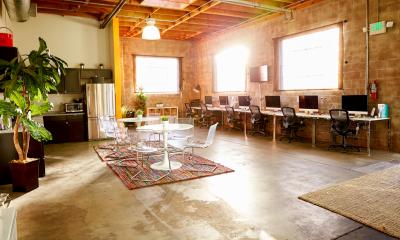
Setting up your own business is a big step; the next key decision to make is where to do it. Rachel Miller outlines the pros and cons of working from home, renting office space or buying your own premises
If you're setting up in business, one of the big decisions you'll have to make is where to base yourself. If you're starting small, that decision may seem obvious - a home office is going to be far cheaper than premises. Home offices are certainly the norm for many self-employed people, from accountants to artists.
But there are other considerations for entrepreneurs that need space for their start-up. Do you need to meet with clients or suppliers on a regular basis? Do you need somewhere to showcase your products or keep stock? Are you likely to take on staff in the near future?
Above all, you need to ask yourself, where will you be most productive? Is home a peaceful haven where you can concentrate, or is it full of domestic clutter and distractions? Would premises give you the space you need to thrive - or would it feel like a millstone around your neck?
To help you decide what's best for you and your business, we've looked at the pros and cons of working from home, renting office space and buying your own premises.
Working from home
Pros:
- It's flexible - you can always move into premises at a later date if necessary.
- There are far fewer overheads beyond buying a suitable desk and office chair - good if your income is not yet steady.
- You can rent a room to your business and offset the rent against tax.
- You don't have to spend time commuting to work.
- You can dress as casually as you like.
- You have complete control over your schedule - you can fit domestic tasks into your day; if you want to work late, you can.
- It can reduce stress and improve your work-life balance.
- You may be more productive at home where there are fewer distractions.
- You can use virtual office services if you want a credible business address and access to a telephone receptionist and PA services without the cost of a physical office space.
Cons:
- You may not be able to invite clients to your home, so you'll have to find suitable meeting places elsewhere.
- There may be too many distractions, particularly if you have a young family.
- You may find it hard to switch off.
- It can be lonely - there's no office camaraderie.
- Space may be limited; it's best if work and domestic spaces are separate (an office in the garden or spare room for example) and you can close the door on work at the end of the day.
- You may not have space for more staff; don't forget health and safety and employment laws if employees work in your home.
- It may not suit your brand - if your business is high-end or cutting-edge, a home office may not fit your professional image.
- You could become complacent or lose ambition - moving into premises could kickstart your growth plans.
- Your business could be a nuisance to neighbours if it creates disturbances such as noise.
- You may need to pay for extra security or insurance if you have expensive equipment in your home.
Renting office space
Pros:
- There are options to suit every budget - from hot-desking, co-working spaces and serviced offices to long-term leases.
- A "proper" office makes a good first impression.
- You often get affordable access to services such as receptionists, office cleaning, building maintenance, parking spaces and internet access.
- Access to a meeting room allows you to see clients or conduct interviews in a professional setting.
- Working alongside other businesses can provide camaraderie and the potential for collaboration.
- You can find a location in a business district or city centre with good transport connections where clients can easily come to you.
- Serviced offices often have flexible terms and make it easy to scale up or down.
Cons:
- You may be locked into a contract, and you'll have fixed overheads every month.
- You have less long-term security - your landlord may not renew your lease.
- There may be limits on how much you can adapt your office space to suit your needs.
- You are reliant on a landlord to make repairs and keep the premises in good working order.
- Shabby rented offices could reflect badly on your business.
Buying premises
Pros:
- It's an asset that could increase in value.
- It gives you space to grow your business and allows you to take on more staff.
- It looks professional and trustworthy; the right décor, furniture and signage can improve your image and reputation.
- Commercial mortgage payments are likely to be cheaper than commercial rent; you can also take out a fixed rate mortgage to control costs.
- You can sub-let spare space to bring in additional income.
- Interest payments on a commercial mortgage are tax-deductible.
Cons:
- It's a big financial commitment and you may need to find a hefty cash deposit (25% is typical) before you can buy.
- Your overheads may fluctuate if mortgage rates or business rates change.
- It's not very flexible - it may be hard to sell if you need to relocate.
- You are responsible for everything - from buildings maintenance and furnishings to security
Browse topics: Business premises



